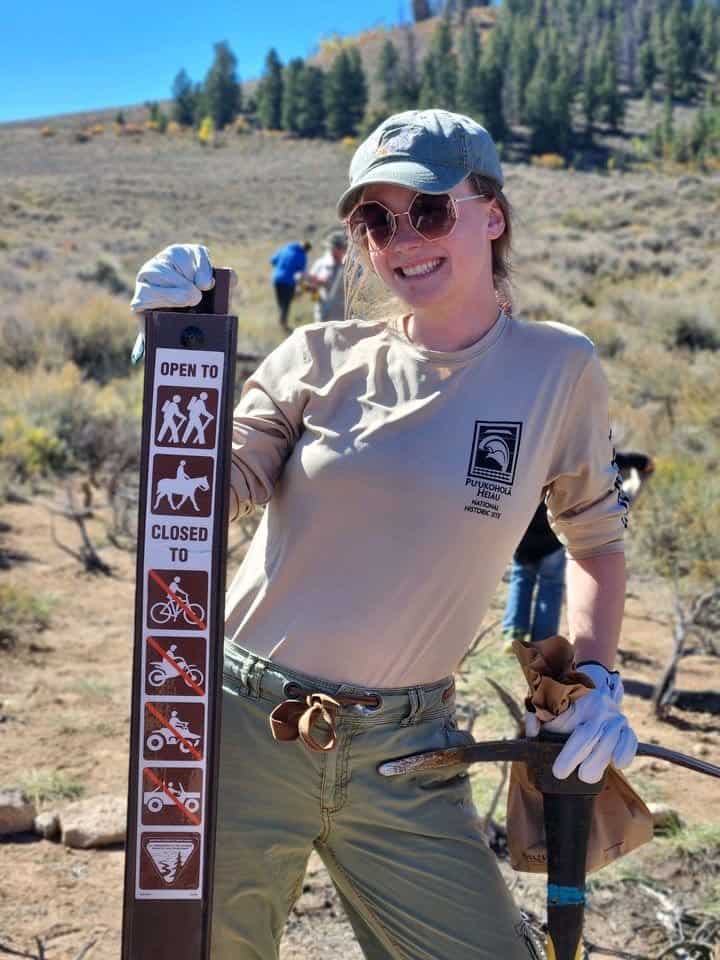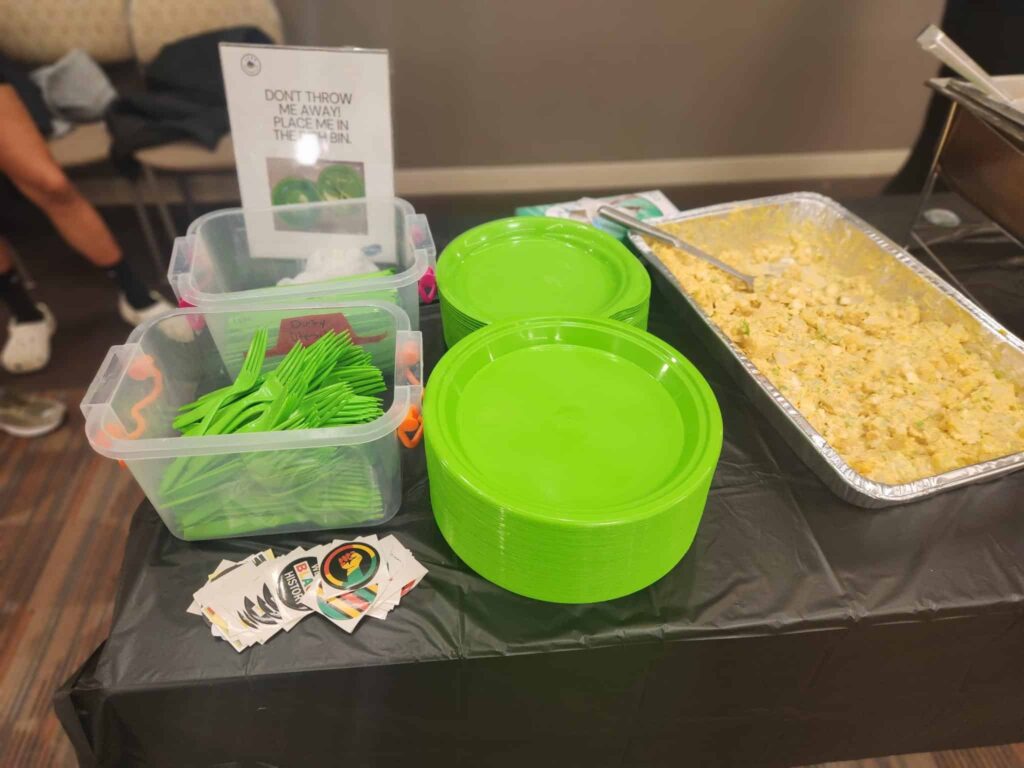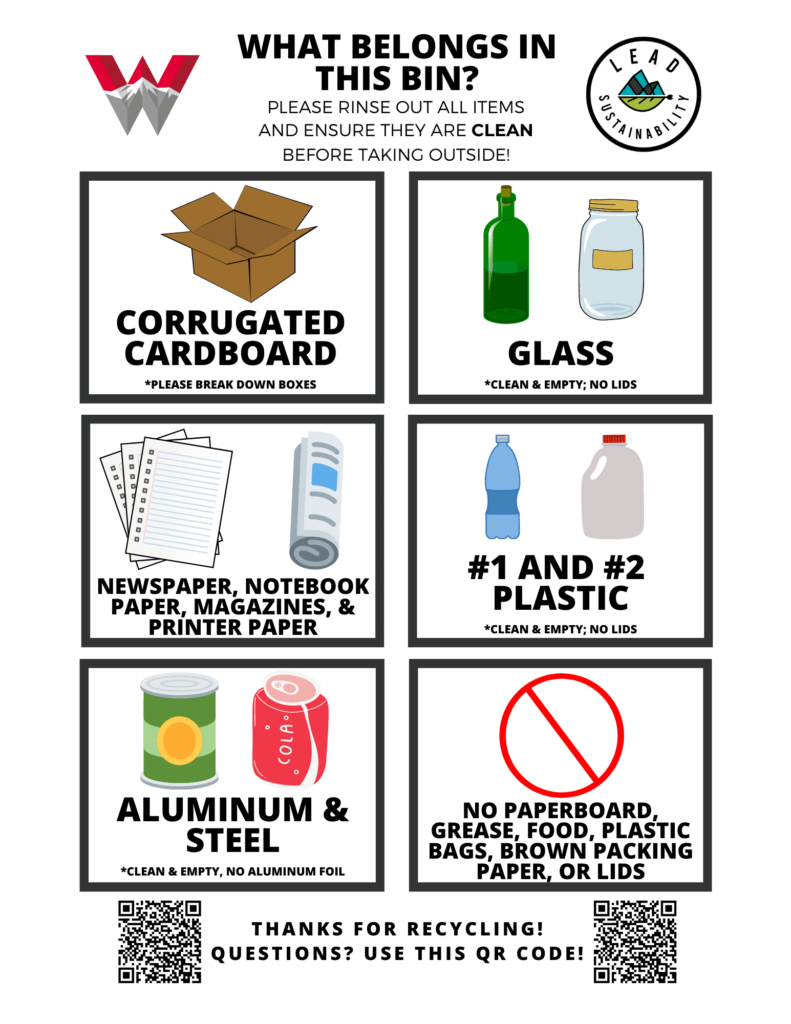
“It’s been really rewarding to take on these [sustainability] projects,” says Paige Kempker, a first-year Master’s of Environmental Management (MEM) student involved across many of Western’s ongoing environmental efforts.
After earning a bachelor’s degree in environmental science at Sam Houston State University in eastern Texas in May 2022, Kempker is enjoying the opportunity to put her environmental background into practice with a student leadership role at Western.
On campus, she works as a LEAD Sustainability graduate mentor (along with fellow first-year MEM student Etinosa Igunbor) and as Western’s Sustainability Coordinator, a role she began back in September.
As part of that coordinator role, Kempker is overseeing Western’s participation in the Race to Zero Waste (R2ZW), a nationwide, eight-week competition run by the nonprofit National Wildlife Federation that pits colleges in a friendly competition to determine the best recyclers.
This year, the competition officially got underway on Jan. 30 and will run through March 25, with final results to be published on April 28.
The race is on
Under the umbrella of R2ZW, colleges can compete in a series of different categories designed to measure various aspects of recycling and general sustainability. This year, Western is competing in the diversion and per capita categories.
The diversion rate measures the percentage of Western’s total waste which is kept out of the local, county-operated landfill situated west of Gunnison.
Key to those efforts are the university’s recycling crew, a staff of Western students who rove around campus collecting, sorting, and trucking Western’s recyclables to Gunnison’s recycling facility.
After a number of graduations, Kempker has been hard at work rebuilding and training up the school’s recycling team.
Campus waste: An ongoing struggle
Historically, Western’s overall diversion rate during past R2ZW competitions has hovered in the 10 to 13 percent range. Last year, Western’s diversion rate came in at about 14 percent.
The recycling program at Western has experienced systemic issues tracing back decades that have contributed to the stagnating diversion rate.
One of the main challenges is the difficulty of annually educating a new class of Western students about the university’s multi-stream recycling program, which requires careful sorting at the school’s indoor and outdoor collection stations.
Western students often come from western slope counties that may not have any recycling at all, or from communities like Denver that have single-stream recycling. Getting everyone up to speed on the new system can prove challenging.
Another issue is the prevalence of non-recyclable items like paperboard and plastics #3 through #7 — which can often confuse students, faculty, and staff with good intentions. Sorting out these items occupies valuable time for the school’s already busy recycling crew.
When you layer on the freezing Gunnison temperatures, and the habit many students make of dumping all their accumulated waste together — recyclable or not — before breaks and at the end of the semester, you can begin to see why boosting the campus recycling rate has proven notoriously difficult for Kempker’s predecessors.
This year, Kempker and crew will seek to engage Western’s campus and boost the university’s numbers via outreach, including in-person tabling outside the Rare Air Café (RAC) featuring recycling education, and online efforts in the form of weekly sustainability and recycling trivia on LEAD Sustainability’s Instagram page, where students will be able to secure sustainability swag in exchange for correct responses.
Striving for success
In the past, recycling weight calculations have been made by weighing full bins of the university’s eight types of non-cardboard recycling — office paper, magazines, green glass, brown glass, clear glass, aluminum, tin, and plastics (Note: Gunnison only recycles #1 and #2 plastics in the city’s facility, so check the bottom beforehand) — and estimating the number of total bins collected to calculate the weight of recycled material.
Fortunately for Kempker and her crew, the recycling team will be able to make use of an industrial scale to weigh the truck before and after collections to determine the total weight of recyclables during the competition.
This new method should provide more accurate metrics for campus recycling moving forward, including for Western’s other R2ZW category, Per Capita Classic, which calculates the average number of pounds of recycling per person on a university’s campus.
During last year’s competition, Western produced roughly 6.2 lbs. of recycled materials per person over the eight-week span, keeping 23,600 lbs. of waste from the landfill.
On the waste side, Western produced more than 10 metric tons of garbage, or 20,600 lbs., every week in 2022 — more than 165,000 lbs. in all over the course of the 2022 competition. That translates to about 43 lbs. per person.
That is quite a healthy sum, and one that Kempker and Co. would like to see shrink with time.
So far this year, Mountaineers have recycled just over a pound of material per student, placing Western 48th out of 70 competing colleges in the early days of competition.
Stepping up for sustainability
In her role as LEAD Sustainability graduate mentor, Kempker has assisted with a hiring spree to round out the LEAD Sustainability team, a cohort of students overseen by orientation and LEAD director Sara Phillips.
The LEAD Sustainability program provides environmental education to students, administers the school’s zero-waste kits, runs sustainability-focused campus tours — and perhaps most important for food lovers — facilitates the annual Earth Day Barbeque in April.
The group also facilitates the usage of zero waste kits for large events across campus, including at the recent Black Student Alliance’s recent Soul Food Night in the UC.

An annual favorite, this year’s rendition of Earth Week will culminate with a mid-day Earth Day Barbeque that will lead into SpringFest later that evening.
Kempker is excited to take on the event’s planning as the young LEAD Sustainability team continues to coalesce and mature.
“I’m already seeing the LEAD Sustainability team taking more initiative than they were last semester,” she adds.
This spring, the LEAD Sustainability will also continue with its Sew Session events, an education initiative where students can come learn how to repair, upcycle, and extend the functional lifespan of their clothing
Additionally, students, faculty, and staff at Western can check out FreeCycle, Western’s free thrift store, which features lightly used clothing, winter apparel (Kempker herself credits it for preparing her for Gunnison winters), outdoor gear, books, and more.
Additionally, students will have the option to work with FreeCycle on Western ODK’s Spring Day of Service, taking place March 5. Participating students will help paint the walls and install new shelves.
FreeCycle is located in the basement of Ute Hall, and is open weekdays from 2 to 5 p.m. this spring.
And for those looking to declutter, FreeCycle is always a good option for donations that will be rehomed. FreeCycle accepts:
- Clothing, including shoes and hats
- Appliances and kitchen items
- Decor
- Books and games
- Other approved items in good shape (it’s okay to show up and ask!)
For those asking the eternal question: “Can I recycle this?” Look no further!
On Western’s campus, the following items can be recycled across campus recycling stations:
- #1 and #2 plastics (check the bottom if you aren’t sure, and make sure to clean them out and take off the caps first!)
- Clean green, brown, and clear glass bottles (no blue glass)
- Aluminum cans (please don’t crush them!)
- Tin/steel products
- Office paper
- Magazines/glossy paper (recycled separately from office paper)
- Corrugated cardboard- (not paperboard-make sure to check the side!)


I couldn’t resist commenting. Very well written!
Way cool! Some very valid points! I appreciate you penning this article and the rest of the website
is really good.
You really make it seem so easy with your presentation but I
find this topic to be really something that I think
I would never understand. It seems too complicated and very broad for me.
I’m looking forward for your next post, I’ll try to get
the hang of it!
Right here is the right site for anyone who hopes to find out about this topic.
You understand a whole lot its almost hard to argue with you (not
that I personally will need to…HaHa). You certainly put a new spin on a topic that has been written about for many years.
Great stuff, just wonderful!
This website truly has all of the information I wanted about this subject and didn’t know who to ask.